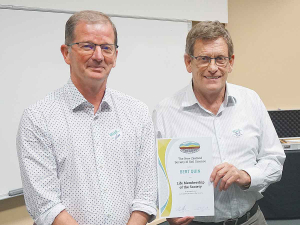Geopolitical shifts drive fertiliser market volatility – Ravensdown
According to Ravensdown's most recent Market Outlook report, a combination of geopolitical movements and volatile market responses are impacting the global fertiliser landscape.
 Dr Bert Quin (right) receiving his Life Membership of the NZ Soil Science Society late last year, for “Distinguished Service to Soil Science”.
Dr Bert Quin (right) receiving his Life Membership of the NZ Soil Science Society late last year, for “Distinguished Service to Soil Science”.
Quinfert owner, Bert Quin says his autumn fertiliser sales are nearly double last year’s.
This is despite farmer difficulties with the extended drought and getting their stock processed, not to mention complications arising from COVID-19.
He claims this a clear sign that more and more farmers are seeing through the “disinformation campaign” about Quinfert’s Algerian RPR, touted as an environmentally protective fertiliser<.
“It has longed been ranked one of the very best RPR’s internationally, in all the internationally used tests, and even more importantly, in field trials”, Quin says.
“Putting the hard facts forward in regular print advertising has had a large role to play in this”.
Quin believes farmers are becoming increasingly cynical about what they are being told by their regular supplier.
“They have been told for decades that soluble P doesn’t get lost in significant amounts to the environment in runoff or leaching. Now, with Quinfert appearing on the scene with its true RPR, farmers are being offered a drilling super type product as the saviour for the environment because it has far lower P losses than superphosphate,” he adds.
“Farmers were also told that high-performance RPR had become very hard to get.”
But Quin says that Algerian RPR had been available all the time and was offered to the industry.
The South Island Dairy Event has announced Jessica Findlay as the recipient of the BrightSIDE Scholarship Programme, recognising her commitment to furthering her education and future career in the New Zealand dairy industry.
New Zealand and Chile have signed a new arrangement designed to boost agricultural cooperation and drive sector success.
New DairyNZ research will help farmers mitigate the impacts of heat stress on herds in high-risk regions of the country.
Budou are being picked now in Bridge Pā, the most intense and exciting time of the year for the Greencollar team – and the harvest of the finest eating grapes is weeks earlier than expected.
The Real Estate Institute of New Zealand (REINZ) has released its latest rural property report, providing a detailed view of New Zealand’s rural real estate market for the 12 months ending December 2025.
Rural retailer Farmlands has released it's latest round of half-year results, labeling it as evidence that its five-year strategy is delivering on financial performance and better value for members.